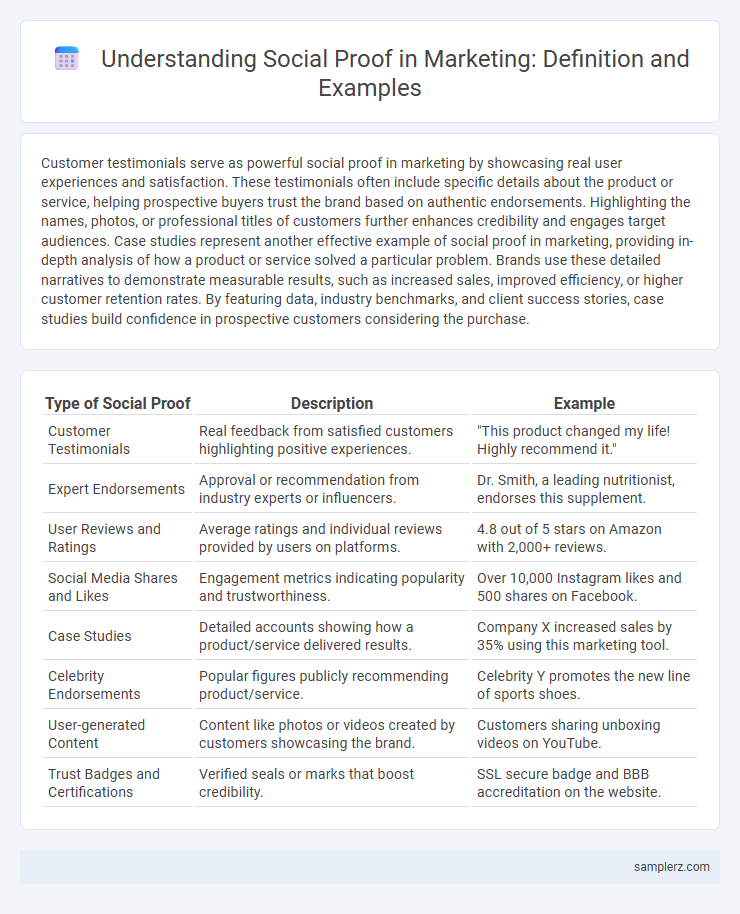Customer testimonials serve as powerful social proof in marketing by showcasing real user experiences and satisfaction. These testimonials often include specific details about the product or service, helping prospective buyers trust the brand based on authentic endorsements. Highlighting the names, photos, or professional titles of customers further enhances credibility and engages target audiences. Case studies represent another effective example of social proof in marketing, providing in-depth analysis of how a product or service solved a particular problem. Brands use these detailed narratives to demonstrate measurable results, such as increased sales, improved efficiency, or higher customer retention rates. By featuring data, industry benchmarks, and client success stories, case studies build confidence in prospective customers considering the purchase.
Table of Comparison
| Type of Social Proof | Description | Example |
|---|---|---|
| Customer Testimonials | Real feedback from satisfied customers highlighting positive experiences. | "This product changed my life! Highly recommend it." |
| Expert Endorsements | Approval or recommendation from industry experts or influencers. | Dr. Smith, a leading nutritionist, endorses this supplement. |
| User Reviews and Ratings | Average ratings and individual reviews provided by users on platforms. | 4.8 out of 5 stars on Amazon with 2,000+ reviews. |
| Social Media Shares and Likes | Engagement metrics indicating popularity and trustworthiness. | Over 10,000 Instagram likes and 500 shares on Facebook. |
| Case Studies | Detailed accounts showing how a product/service delivered results. | Company X increased sales by 35% using this marketing tool. |
| Celebrity Endorsements | Popular figures publicly recommending product/service. | Celebrity Y promotes the new line of sports shoes. |
| User-generated Content | Content like photos or videos created by customers showcasing the brand. | Customers sharing unboxing videos on YouTube. |
| Trust Badges and Certifications | Verified seals or marks that boost credibility. | SSL secure badge and BBB accreditation on the website. |
Influencer Endorsements: Leveraging Popular Voices
Influencer endorsements amplify brand credibility by showcasing trusted personalities with large followings, creating authentic connections with target audiences. Brands leveraging influencers see higher engagement rates, as followers are more likely to trust recommendations from familiar social media figures. This strategy enhances conversion rates, boosts brand awareness, and drives sales through genuine, relatable endorsements.
Customer Testimonials: Building Trust With Real Stories
Customer testimonials serve as powerful social proof by showcasing authentic experiences from satisfied buyers, which enhances brand credibility and influences purchasing decisions. Highlighting diverse testimonials across multiple platforms, such as websites, social media, and email campaigns, maximizes their impact and reach. Incorporating specific details like product benefits and measurable results within these stories increases trust and encourages potential customers to convert.
Case Studies: Demonstrating Success in Action
Case studies serve as powerful social proof by showcasing real-life examples of how products or services deliver tangible results to customers, increasing trust and credibility. Detailed narratives highlight specific challenges, solutions implemented, and measurable outcomes, providing potential clients with relatable and convincing evidence of success. These documented successes effectively influence purchasing decisions by illustrating proven value and ROI in practical scenarios.
Celebrity Partnerships: Elevating Brand Credibility
Celebrity partnerships significantly elevate brand credibility by leveraging the influencer's established trust and massive follower base, which enhances consumer confidence and stimulates purchase intent. Brands such as Nike collaborating with athletes like Michael Jordan demonstrate how endorsements create powerful aspirational connections, driving increased engagement and sales. These collaborations often generate extensive social media buzz and media coverage, further validating the brand's reputation and expanding its market reach.
Social Media Shares: Creating Viral Validation
Social media shares act as powerful social proof by amplifying brand credibility and trust through peer endorsement. Viral validation occurs when user-generated content and shares create momentum, increasing organic reach and driving conversions. Brands leveraging high share counts on platforms like Instagram, Facebook, and TikTok benefit from enhanced visibility and social confirmation.
User-Generated Content: Authentic Engagement Examples
User-generated content (UGC) serves as powerful social proof in marketing by showcasing authentic engagement from real customers. Brands leveraging UGC often feature customer photos, reviews, or testimonials on social media and websites to build trust and credibility. This approach increases conversion rates by demonstrating genuine satisfaction and fostering community involvement.
Reviews and Ratings: Establishing Product Reliability
Customer reviews and ratings serve as powerful social proof in marketing by directly influencing buyer trust and purchase decisions. High ratings and positive testimonials enhance product reliability perception, driving higher conversion rates and brand credibility. Platforms featuring verified reviews amplify authenticity, reinforcing consumer confidence in product quality and service satisfaction.
Expert Recommendations: Authority Driving Decisions
Expert recommendations leverage industry authority to influence consumer decisions by showcasing endorsements from credible professionals and recognized leaders. This form of social proof increases trust and credibility, often leading to higher conversion rates when potential customers see respected experts validate a product or service. Highlighting certifications, partnerships, or testimonials from authoritative figures maximizes the impact of expert-driven marketing strategies.
Trust Badges and Certifications: Visual Signals of Credibility
Trust badges and certifications serve as powerful social proof by visually signaling a brand's credibility and reliability to potential customers. Featuring recognized seals from industry authorities or secure payment icons on e-commerce websites significantly increases consumer trust and conversion rates. These trust indicators validate the authenticity of products or services, reducing purchase anxiety and enhancing overall brand reputation in competitive markets.
Subscriber Counts and Follower Numbers: Quantifying Popularity
Subscriber counts and follower numbers serve as powerful social proof indicators, demonstrating a brand's popularity and credibility in the market. High metrics on platforms like YouTube, Instagram, and TikTok signal consumer trust and influence purchasing decisions by showcasing widespread acceptance. Marketers leverage these quantifiable figures to attract new audiences and validate product value through perceived social validation.

example of social proof in marketing Infographic
 samplerz.com
samplerz.com